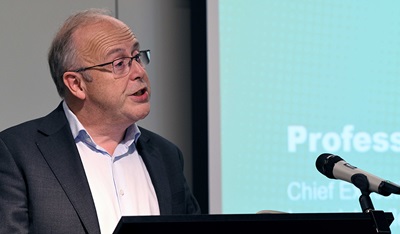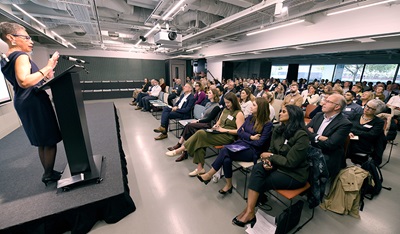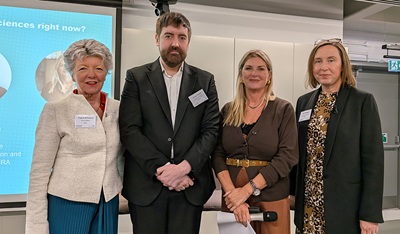Paddington Life Sciences Symposium celebrates the power of collaboration in life sciences
Imperial College Healthcare NHS Trust hosted its second Paddington Life Sciences Symposium, convening leaders from the NHS, academia, industry, and community organisations to explore the future of UK life sciences.
Held at the Storey Club in Paddington, the event welcomed over 150 attendees and showcased the strength of place-based innovation and cross-sector collaboration within the life sciences sector.
Two years of progress for Paddington Life Sciences 
Paddington Life Sciences is a growing partnership led by the Trust, that bring together the NHS, industry and academic organisations with a shared commitment to developing a life sciences cluster centred around St Mary’s Hospital in Paddington. The initiative aims to drive innovation, improve health outcomes, and deliver economic and social value.
Opening the symposium, Professor Tim Orchard, chief executive of Imperial College Healthcare NHS Trust, reflected on the journey so far and reiterated the importance of ensuring the NHS remains central to the future of life sciences.
“At the launch of Paddington Life Sciences over two years ago, I made the call to action – ‘life sciences is key to the future of the NHS but equally we must make sure the NHS is key to the future of life sciences in this country’. This is even more relevant now – and, positively, I think the call is being heeded,” he said.
Celebrating NHS-industry partnerships
The event was co-sponsored by Takeda, a founding member of Paddington Life Sciences. Şeyda Atadan Memiş, general manager of Takeda UK & Ireland, spoke about the company's commitment to NHS collaboration and its focus on improving outcomes for patients in north west London.
Speaking to the symposium, she said: “Paddington Life Sciences is a shining example of how collaboration works in practice: NHS, academia, and industry working together with shared and progressive purpose. We have seen this, for example, with the group’s commitment to making the UK a global leader in inclusive and diverse clinical trials.”
Global perspective on building innovation ecosystems

In a keynote address, Dr Susan Windham-Bannister, president and CEO of Biomedical Growth Strategies, shared insights from her leadership of the Massachusetts Life Sciences Initiative and the development of Kendall Square. She emphasised the importance of place-based strategies and long-term investment in building successful innovation ecosystems.
Drawing on her experience, Dr Windham-Bannister illustrated how Massachusetts successfully brought together academia, industry, government, and economic development agencies around shared goals — creating a coordinated ecosystem where partners understood available resources and how to access them.
Panel discussion on opportunities in UK life sciences
The final session featured a panel discussion chaired by Angela McFarlane, vice president of strategic planning at IQVIA, with panellists including:
-
Jo Taylor, VP Corporate Affairs, Shionogi Europe
-
Clare Morgan, Director of Impact and Partnerships, NICE
-
James Pound, Interim Executive Director, Innovation and Compliance, MHRA
The discussion explored how to accelerate access to innovation and deliver better care more quickly.
“We discussed how to get the best care to people faster - by embedding innovation into clinical guidelines, widening access, and making parallel decisions to speed up medicines approval,” she said. “The link between health and growth was clear. Collaboration between industry and public sector organisations is essential to unlocking new opportunities, managing risks, and ensuring the system is prepared for the future.”
Looking ahead
Closing the symposium, Dr Bob Klaber, director of strategy, research and innovation at the Trust, summarised the day’s themes with three words: intent, collaboration, and ambition.
As Paddington Life Sciences enters its next phase, the symposium reaffirmed its role as a vibrant hub for collaboration - harnessing the strengths of the NHS, academia, industry, and the community to shape the future of life sciences in the UK.



